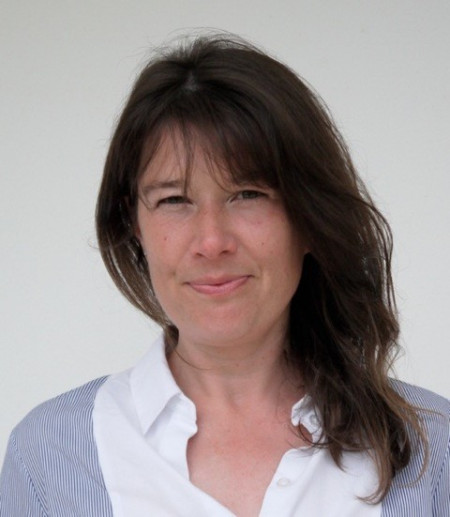
Prf Sara Haslam
Professor Of Twentieth Century Literature
Biography
Professional biography
I joined the Open University in 2001, having taught previously at King’s College London, the University of Roehampton, and the University of Chester, where I also completed a PGC in Higher Education. I studied at the University of Liverpool for my first degree, in English Language and Literature, and my MA in Victorian Literature. During my MA studies I was employed part-time as a Research Assistant on editions of Percy Bysshe Shelley's and Matthew Arnold's poetry - my first taste of scholarly editing. I moved to London to work on Ford Madox Ford for my PhD, which was awarded by King's College, London in 1997. My examiners were Professors Bernard Bergonzi and Philip Horne.
At the OU, I have written teaching material for all levels of study, worked as Chair and Deputy Chair of modules in production and presentation, and served as Director of Research Degrees in the Faculty 2019-2024. I have produced OpenLearn material and acted as the OU's academic consultant to the BBC. As critic, and as editor, my research on Ford Madox Ford is internationally known, and I was Chair of the Ford Madox Ford Society for 10 years to 2020. As a teacher and as a researcher I am passionate about what I do because I believe in literature as a force for good, as an agent of change, as well as an education, a distraction, and a delight. In my current research on what I have termed 'literary caregiving', I'm finding out more about the women who organised internationally to provide books to sick and traumatized soldiers during the First World War.
Research interests
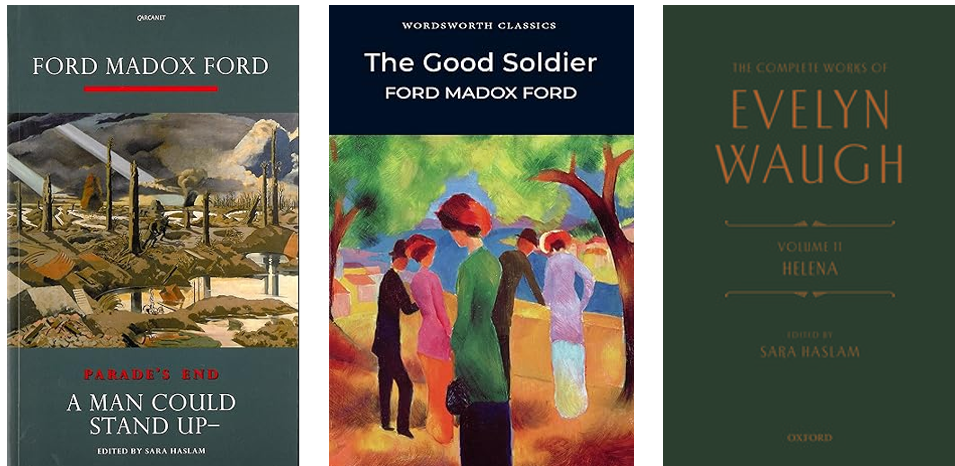
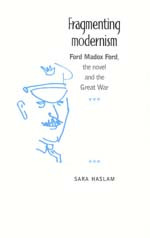 There are three inter-related strands to my research profile: the work of Ford Madox Ford, scholarly editing, and literature in and of the First World War, especially contemporary bibliotherapy and literary caregiving.
There are three inter-related strands to my research profile: the work of Ford Madox Ford, scholarly editing, and literature in and of the First World War, especially contemporary bibliotherapy and literary caregiving.
My monograph on Ford, Fragmenting Modernism: Ford Madox Ford, the Novel and the Great War was re-released by Manchester University Press as part of its OAPEN project. I've edited Ford's works - you can read my introduction to his modernist classic The Good Soldier - and also volumes of International Ford Madox Ford Studies (2005-2015). I was part of the team which produced the first critical edition of Ford's First World War tetralogy Parade’s End (1924-28; Carcanet Press 2010-11), editing volume 3, A Man Could Stand Up-. Also in Ford studies, I co-edited the Routledge Research Companion to Ford Madox Ford (2019), a wide-ranging collection of essays designed to inform and support research by a new generation of scholars.
I edited Helena, Evelyn Waugh's 1950 novel about the mother of Emperor Constantine, as part of Oxford University Press's project: The Complete Works of Evelyn Waugh. Waugh described this, his only historical fiction, as a favourite among his books. The Daily Express agreed with him, calling Helena his 'best novel yet' (12 October 1950). The launch was in November 2020, and the Tablet published my piece 'Evelyn Waugh's favourite heroine' that same month. My attention as editor is now fully focused once more on Ford. The Complete Works of Ford Madox Ford, a series of which I am co-General Editor, is to be published by Oxford University Press. The Collected Letters of Ford Madox Ford (6 vols), the first phase of the project, is well underway and I am co-editor, with Dr Helen Chambers, of vol. 1. Early outputs include 'The Hueffers and the Conrads in 1899' published in The Conradian, vol. 47, no. 1 (2022) and 'The Case of a Missing Cromwell: Ford Madox Ford, Art, Life and Letters in 1899', Last Post: a Literary Journal from the Ford Madox Ford Society, vol. 1, nos 8-9 (2022). I'm particularly enjoying the heightened focus on Ford's wife, Elsie Martindale Hueffer, generated by this work.
My research on Ford's war fiction developed into a broader interest in the literature of the First World War and, since 2015, 'literary caregiving' - the therapeutic deployment of books and reading 1914-18. My article, 'Reading, Trauma, and Literary Caregiving 1914-1918: Helen Mary Gaskell and the War Library', published in the Journal of Medical Humanities, is available here, and my co-authored article '"Medicinable Literature": Bibliotherapy, Literary Caregiving, and the First World War' was published in Literature and Medicine, vol. 30, no. 2 (2021). Since 2018 I've presented on this and related work as part of open access OU course content in text and film, as well as to academic audiences.
My publications also include articles and book chapters on Ford, Thomas Hardy, Henry James, the Brontës, Joseph Conrad, and a co-written book on life writing.
I peer review for a number of journals and academic and trade publishers, and have served on the AHRC's Peer Review College. I particularly enjoy my role as a supervisor, and nine of my students have successfully completed their PhDs.
Teaching interests
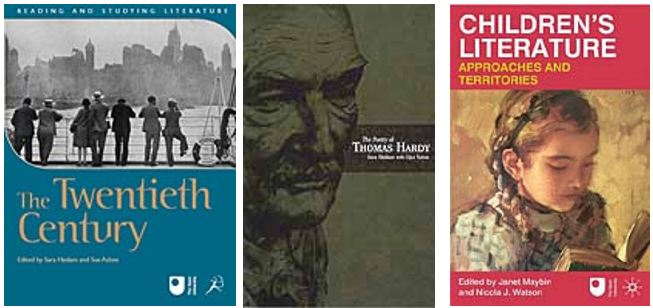
I have written Open University teaching materials for all levels of study, from Access to PhD, and have served as Module Chair and Deputy Chair on Module Teams.
In recent years my teaching commitments have included the MA in English Literature, where I contributed a unit on the modernist short story, a Level 1 interdisciplinary module, Cultures, for which I wrote on Jane Eyre, and a Level 3 module, Literature in Transition, for which I wrote material on Ford's The Good Soldier. My work on the Level 2 module, Reading and Studying Literature, where my teaching units focused on James Joyce's Dubliners, included co-editing The Twentieth Century, pictured above left, with Bloomsbury. I have written teaching material for many other modules across all levels of the English and Creative Writing curriculum, including A215 Creative Writing; A150 Voices and Texts; EA300 Children’s Literature, and A300 Twentieth-Century Literature: Texts and Debates. I was Chair of the Start Writing suite of modules, including Start Writing Fiction and Start Writing Poetry from 2008-2012 and wrote teaching material for Start Writing Essays. I have written teaching material supporting the progress of our PhD students, and I have designed and led PhD training and development events for the department and/or the Faculty in recent years.
My most recent major teaching role was Chair of the Access Module in Arts and Languages (Y031), the theme of which is Popular Protest. I relished the opportunity to work at this level of study, developing materials to ensure students are fully equipped to begin their degrees.
Recent and current research students have undertaken PhDs on Dorothy Whipple, Edith Wharton, Ford Madox Ford, Virginia Woolf, Joseph Conrad, Thomas Hardy, and the literature of the First World War. Informal PhD enquiries are welcomed, but please also refer to the Postgraduate section of our departmental website for further relevant information.
Impact and engagement
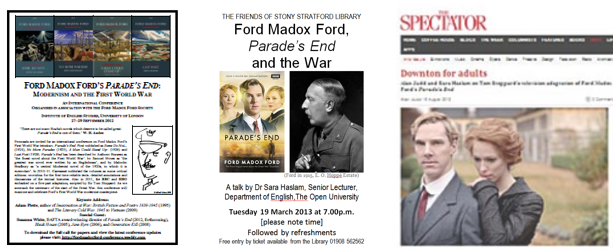
In 2020-22, my major external engagement was with the BBC in my role as nominated academic for the OU on the 8-part series Art That Made Us. I also served in this capacity for Sally Wainwright's 2016 docudrama To Walk Invisible, about the life and work of the Brontës. A documentary film on Ford’s life and work for which I was an interviewee, It Was the Nightingale: the Unreliable Story of Ford Madox Ford had its official launch in 2017.
I have written/filmed OpenLearn material on, for example, Ford Madox Ford, the Brontës, a women's suffrage banner, and on Endell Street Military Hospital's ground-breaking war-time caregiving. The Endell Street story is a fundamental part of my literary caregiving research. A 2018 short film about this suffragette-run military hospital is here http://www.open.edu/openlearn/history-the-arts/history/100-years-votes-some-women. I've given seminar presentations on related work at 3 UK prisons, co-authored a Conversation piace, and was invited to present at the Authors' Club, at the National Liberal Club, on 'Writing, Healing and the First World War' (2018).
As the anniversaries of the First World War approached I was involved in impact and engagement activity surrounding Parade's End, a pre-eminent example of war literature. I was academic consultant and an interviewee for the Culture Show Special, ‘Who on Earth was Ford Madox Ford?’ (BBC2, 1 September, 2012), and academic consultant for a second BBC project, ‘The World of Parade’s End’ (BBC2, 24 August, 2012). Filming of the BBC/HBO serialisation of Parade’s End (dir.Susanna White), which was scripted by Tom Stoppard, began in 2011, and a high point of that year was a visit to the set. I co-authored a magazine article in the Spectator on the adaptation (18 August, 2012), and delivered talks on Ford Madox Ford as part of the South Bank ‘The Rest is Noise’ Festival and at Stony Stratford library in February and March 2013. At an open session of the Parade’s End Ford Madox Ford conference, held in London in 2012, I chaired a question-and-answer session with Susanna White and Rupert Edwards, producer of the Culture Show Special.
Two 2020 blogs discussed live research interests: Finding Helena and Books for Travel in a Time of Crisis: the Word Deployed by Ward and Solnit | Faculty of Arts and Social Sciences (open.ac.uk) and in the print media I have had pieces published in the TLS, the Tablet and the Scotsman, as well as the Spectator.
External collaborations
As co-General Editor of The Complete Works of Ford Madox Ford, my major current external collaboration is with OUP and the members of the Editorial Board, as well as volume editors.
I was an Editorial Board member of International Ford Madox Ford Studies to 2015, and am a member of the Editorial Board of Last Post: a Journal of the Ford Madox Ford Society.
My external research networks include the Complete Works of Evelyn Waugh project team, the Medical History of the First World War network and WAR-Net, an interdisciplinary network for scholars working on war representation.
The Ford Madox Ford Society holds an annual conference, has a North American chapter, and fosters many of my research links and collaborations.
International links
I work closely with academics in France, Italy and North America in particular in the area of Ford Studies. My current work on Ford's letters is enabling the further forging of links with academics working on similar projects in Europe more widely, New Zealand and Australia.
Ford's papers are held at Cornell University, Ithaca, New York, as well as in the New York Public Library, NYC; and much of my current work on the women who powered First World War literary caregiving is founded on links with institutions and academics in the United States.
Projects
The Bridge to Joyceland and Beyond: Ford Madox Ford in the Twenty-First
I have received a 5k BA/Leverhulme Small Grant for my research project: ‘The Bridge to Joyceland and Beyond: Ford Madox Ford in the Twenty-First Century’ which will involve archival work at two libraries in the US. Cornell University houses the most significant collection of Ford’s manuscripts and papers, and there I will be accessing materials related to his early life and work as I prepare a proposal for a volume of his fairy tales and develop a database of his letters. During a second trip, to the New York Public Library, I will document Ford’s final book collection, donated to the library in the 1990s. Considering how well-connected Ford was in the 1920s and 1930s, I shall be looking for significant dedications as well as marginalia as I prepare an essay on the collection for the inaugural issue of the new Ford Society Journal.
Publications
Book
A Hundred Years of Bibliotherapy: Healing through Books (2025)
The Complete Works Evelyn Waugh: Helena. Volume 11 (2020)
The Routledge Research Companion to Ford Madox Ford (2018)
Ford Madox Ford's The Good Soldier: Centenary Essays (2015)
Ford Madox Ford and America (2012)
A Man Could Stand Up- by Ford Madox Ford (2011)
The Good Soldier by Ford Madox Ford (2010)
Ford Madox Ford and the city (2005)
England and the English (2003)
Fragmenting modernism: Ford Madox Ford, the novel and the Great War (2002)
Book Chapter
Healing through Books: An Introduction (2025)
Galsworthy’s First World War Writing as Self-Care (2025)
The Other in Ford's Making: Elsie, Fiction and Collaboration (2020)
Ford Studies in the Twenty-first Century: Bibliography, Criticism and the Gaps on the Map (2019)
Dowell and Dopamine: Information, Pleasure and Plot (2015)
Ford as Edwardian author: publishers, trends, markets (2013)
Introduction: "Dreaming Territory" (2012)
Wessex, literary pilgrims and Thomas Hardy (2009)
'To Cook, or to Paint, in Paris? Ford in Colour' (2009)
The prophet and the sceptic: George Eliot and Ford Madox Ford (2007)
Ford Madox Ford: the good soldier (2006)
England and Englishness: Ford's first trilogy (2006)
Portraits of Cities: Ford Madox Ford; Three Essays from an Unfinished Work; (2005)
Anton Chekhov: The Cherry Orchard (2005)
An 'Historian's Methods'?: Between St Dennis and St George and the Language of Propaganda (2002)
Digital Artefact
Contested Ground: alcohol, attachment, and the hut habit at war [Podcast] (2015)
Journal Article
Ford Madox Ford’s Letters, Life Writing, and Editing for a New Era (2025)
Introduction: Ford Madox Ford’s War Writing (2025)
Losing and Finding Balance: Food as Fordian Diagnostic (2022)
The Hueffers and the Conrads in 1899 (2022)
The Case of the Missing Cromwell: Ford Madox Ford, Art, Life and Letters in 1899 (2022)
“Medicinable Literature”: Bibliotherapy, Literary Caregiving, and the First World War (2021)
Reading, Trauma and Literary Caregiving 1914-1918: Helen Mary Gaskell and the War Library (2020)
A literary intervention: writing alcohol in British literature 1915–1930 (2013)
Written in blood: Family, sex and violence in Wuthering Heights and Jane Eyre (2002)
Modern Knowledge and Ford's Modern Novel (2000)
A question of knowledge: James, Ford, "The Beast in the Jungle" and A Call (2000)
Presentation / Conference Contribution
A New Era: Magic, Meaning, Memory and Modernism in Ford Madox Ford's Letters (2023)
Biography of a wartime 'miracle': women's literary caregiving 1914 to 1918 (2022)
'These fragments I have shored against my ruins': Memory and Modernism (2002)